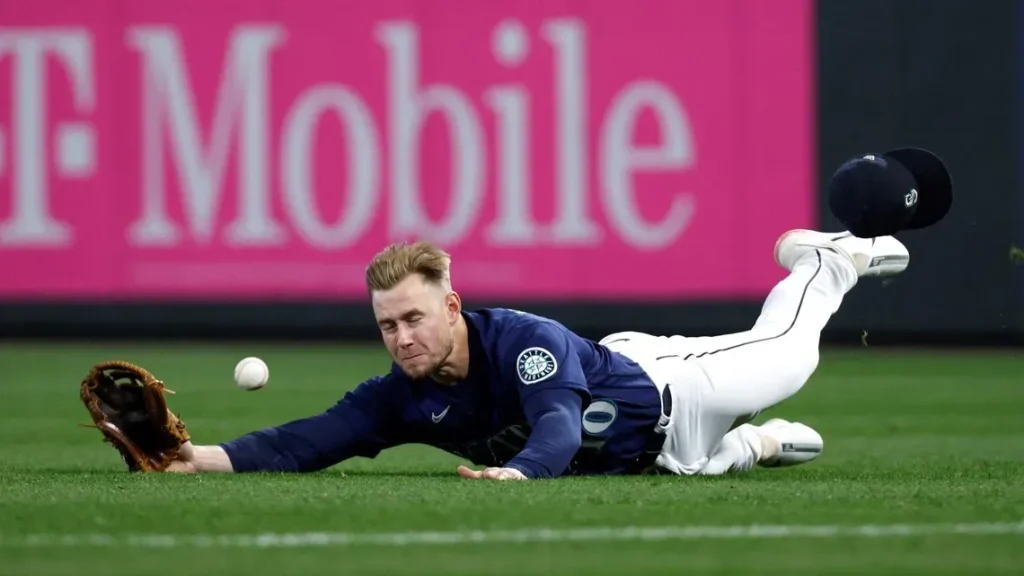In a surprising move, the Atlanta Braves have demoted outfielder Jarred Kelenic to Triple-A, following recent struggles both on and off the field. This decision comes just a week after Kelenic was involved in a clubhouse controversy that sparked reactions from star player Ronald Acuña Jr. During a game against the April 19, Kelenic’s lack of effort was scrutinized, raising questions about MLB player performance and managerial expectations. Acuña’s response to the situation, conveyed through social media, highlighted perceived double standards within the Braves’ clubhouse. With Kelenic hitting only .167 in the early season, his demotion may serve as a wake-up call to rekindle his once-promising career.
The Atlanta Braves have taken a significant step by sending their outfielder Jarred Kelenic back to Triple-A, a move that comes in light of his ongoing challenges this season. Just days earlier, Kelenic found himself in the spotlight due to an incident that triggered a discussion about team dynamics and player accountability, especially following Ronald Acuña Jr.’s candid comments. Fans and analysts are closely watching how this decision reflects broader themes of performance expectations in Major League Baseball. The controversy surrounding Kelenic combines elements of talent management and player behavior, which adds layers to the ongoing narratives in the Braves’ clubhouse. As he transitions back to the minor leagues, Kelenic hopes to realign his game and emerge stronger in future MLB opportunities.
Jarred Kelenic Demoted to Triple-A: Understanding the Context
In a surprising turn of events, the Atlanta Braves have demoted outfielder Jarred Kelenic to Triple-A. This decision comes just days after a controversial incident shed light on Kelenic’s effort levels during a critical game. The Braves were disappointed to see Kelenic fail to hustle after hitting a ball that appeared to be headed for the stands, only to end up hitting the wall. His decision to jog from the batter’s box rather than sprinting to first base raised eyebrows among teammates and coaching staff, leading to conversations around his commitment to the team both on and off the field. While this demotion might seem directly related to hustle problems, it rather stems from Kelenic’s overall poor performance in the season, hitting a mere .167 in his appearances.
The Braves organization, historically focused on maximizing player performance, aims to instill a culture of hard work and dedication amongst its players. While Kelenic’s lack of hustle in that game has become a talking point, it’s critical to understand that his low batting average and OPS (On-base Plus Slugging) of .531 played a more significant role in the team’s decision-making. For a player who was once hailed as a top prospect, these struggles could severely affect his trajectory within an already competitive Braves lineup.
Moreover, Kelenic’s demotion has sparked discussions within the Braves clubhouse regarding effort and accountability, as highlighted by Ronald Acuña Jr.’s vocal response to manager Brian Snitker’s comments about Kelenic’s performance. In light of Acuña’s own history with benchings due to lackluster performance on the basepaths, his remarks added an additional layer to the clubhouse dynamics. This controversy emphasizes not only the expectations that players have for one another but also the intense scrutiny they face as they navigate their careers in Major League Baseball (MLB). Understanding the various facets of this situation will be pivotal for Kelenic as he works to regain his footing and prove his worth, starting with his time at Triple-A.
The Impact of Clubhouse Dynamics on Player Performance
Clubhouse dynamics play a crucial role in shaping player performance, particularly in a highly competitive environment like the MLB. The recent controversy involving Jarred Kelenic and Ronald Acuña Jr. highlights how interpersonal relationships and perceived accountability can affect team morale and individual effort levels. When a player underperforms, as Kelenic has, it can not only disrupt the flow of the game but also influence the attitudes of teammates, especially those who hold strong positions in the clubhouse. The Braves, known for their strong clubhouse culture, may find that situations like these can serve as a litmus test for how unity is maintained under pressure.
The commentary from Acuña reveals the intricate balance players must navigate between accountability and support. Following his comments about a perceived double standard, the Braves management and public will likely scrutinize how they enforce expectations and rules within their ranks. This scrutiny can lead to a vital reassessment of how each player, including Kelenic, aligns with the team’s culture and expectations. Moving forward, the Braves will need to reaffirm their commitment to fostering an environment that encourages hustle and perseverance, ensuring players remain motivated to improve while managing the complexities of relationships in the clubhouse.
Kelenic’s Struggles: A Look into MLB Player Performance Trends
Jarred Kelenic’s performance issues are not unique in the realm of MLB, as many players experience varying degrees of success upon entering the league. With a batting average of just .167 and an OPS below .600, Kelenic’s struggles encapsulate broader trends experienced by young talent transitioning from the minor leagues to the majors. The pressure of expectations can weigh heavily on newly promoted players, causing them to press in their at-bats and lead to inconsistency. The high-stakes environment of MLB can amplify these challenges, making it even more essential for players like Kelenic to find a balance between competitiveness and composure.
As Kelenic returns to Triple-A, he joins a growing list of players who must recalibrate their approach to the game in an effort to regain their form. Historical data shows that many MLB players who struggle initially can benefit from a stint in the minors to rebuild their confidence without the intense scrutiny of the major league spotlight. This practice allows players to refine their skills, develop consistency, and ultimately return stronger when they are given another chance. For Kelenic, the road ahead will involve embracing these lessons and focusing on improvement, hoping to reclaim the promise he once held as a top prospect in baseball.
Ronald Acuña Jr.’s Response: The Larger Conversation Around MLB Accountability
Ronald Acuña Jr.’s reaction to manager Brian Snitker’s handling of the situation with Jarred Kelenic underscores a broader conversation around accountability in the MLB. As a leader within the Braves’ lineup, Acuña’s comments on social media regarding how he felt Kelenic was being treated compared to himself brought to light the intricacies of team dynamics and the importance of leadership accountability. Acuña’s experience of being benched for similar mistakes in the past gives him a unique perspective on how disciplinary actions can vary, fueling conversations about consistency and fairness within the Braves organization. Such discussions are pivotal as they reflect on the values players and management uphold.
Furthering this dialogue raises questions regarding how organizations define and enforce accountability among their athletes. As managers navigate these situations, they must balance discipline and support, especially for younger players like Kelenic who may be struggling with the pressures of performance amid expectations from the front office and fan base. The implications of this controversy highlight the delicate balance of holding players accountable while fostering an environment of growth and learning. As this conversation unfolds, it will be interesting to see how Snitker addresses accountability moving forward and how it impacts the Braves’ performance and team cohesion.
The Journey of Jarred Kelenic: From Prospect to Major Leaguer
Jarred Kelenic’s journey from being a highly-touted prospect with the New York Mets to his current position with the Atlanta Braves showcases the unpredictable nature of MLB careers. Drafted with high expectations, Kelenic once represented the hope of becoming a future All-Star. Nonetheless, his transition to the majors has included setbacks that many young talents face, such as fluctuating performance and a struggle to adapt to the rigors of MLB. His time with the Seattle Mariners allowed glimpses of his potential; however, his overall performance fell short, leading to the recent trade that brought him to Atlanta. This trajectory is emblematic of how prospects are often highly scrutinized, especially once they reach the big leagues.
In the competitive world of MLB, where success can be defined by a few pivotal plays or performances, Kelenic’s experience reflects the harsh realities that come with chasing a dream. Many players, despite their immense talent and potential, struggle to make an immediate impact, facing external and internal pressures. The Braves’ decision to demote Kelenic may serve as a critical moment in solidifying his path forward; it offers him the opportunity to recalibrate and embrace the learning experience found in the minors. If Kelenic can harness this time to refine his skills and regain his confidence, he may have the chance to return stronger and ready to contribute at a higher level.
Analyzing Kelenic’s Performance Trends: Statistical Insights
A deeper analysis of Jarred Kelenic’s performance encapsulates the importance of statistics in evaluating player contributions at the MLB level. With a batting average of .167 and a .531 OPS, Kelenic’s difficulties in achieving offensive consistency are evident. Advanced metrics, whether they involve plate discipline or defensive stats, help provide a comprehensive view of where a player stands. For Kelenic, the need to improve his pitch recognition and on-base skills will be crucial to turning around not only his personal performance but also his perception within the Braves organization. Statistical trends often signify underlying issues that can be addressed, making it essential for players to interpret their numbers constructively.
Additionally, analyzing performance trends offers insight into the broader implications for player development. Coaches and trainers frequently employ these metrics to tailor their training methods, focusing on areas needing improvement. For Kelenic, a return to form could hinge upon proper adjustments made during his time in Triple-A, aiming to build a more stable foundation for future success. This statistical lens not only benefits Kelenic but echoes the challenges faced by many young athletes trying to navigate the complexities of MLB player performance successfully. Reflecting on these trends can guide Kelenic’s journey as he seeks to solidify his place in an organization that once believed in his potential.
Navigating Media Scrutiny: Kelenic’s Experience with the Braves
Media scrutiny plays an unavoidable role in the lives of MLB players, with each on-field decision often examined under a magnifying glass. For Jarred Kelenic, the recent controversy surrounding his hustle and subsequent demotion illustrates the challenges that arise when performance does not meet expectations. Following Acuña Jr.’s remarks on social media, Kelenic’s actions have become a focal point for discussion, drawing attention not only to his performance but also to the broader implications of player accountability within the Braves organization. As players in such high-pressure environments, their ability to manage media narratives becomes crucial in maintaining a healthy focus on the game rather than distractions off the field.
In the age of social media, how Kelenic handles scrutiny will be vital to his growth as a player and person. Well-managed relationships with the media can alleviate some of the pressures that come with being in the spotlight. Transparency and effective communication can enable Kelenic to reshape how he is portrayed and encourage a supportive interaction with fans and analysts alike. Moving forward, Kelenic’s response to adversity—both in terms of performance and public perception—will define his resilience and ability to succeed amidst the overwhelming nature of being a professional athlete.
Future Prospects for Kelenic: A Path Forward
Looking ahead, the future prospects for Jarred Kelenic depend heavily on his ability to adapt and grow from the experiences he’s encountered in the major leagues. With a history of being a highly regarded prospect, the potential for a turnaround remains. The combination of returning to Triple-A and evaluating his weaknesses with the help of coaches can pave the way for a resurgence in his career. Persistence, hard work, and commitment to improvement are essential as he takes these crucial steps toward refining his performance.
Teams often keep a close watch on how players respond to demotions, as this period can reveal character traits that are valuable for future roster decisions. For Kelenic, reclaiming his form means embracing this opportunity earnestly. By honing his skills and managing the media narratives surrounding him, he can potentially break through the barriers that have limited his performance to this point. Fans and organization members alike will be eager to see how he utilizes this moment, aiming for a triumphant return that reflects his true capabilities on the field.
Frequently Asked Questions
Why was Jarred Kelenic demoted to Triple-A by the Atlanta Braves?
Jarred Kelenic was demoted to Triple-A Gwinnett primarily due to his underwhelming performance at the start of the 2025 MLB season, where he hit only .167 with a .531 OPS in 65 plate appearances. Despite being at the center of clubhouse controversy, his demotion is mainly performance-related rather than due to his lack of hustle during games.
What happened during the game that led to the controversy surrounding Kelenic?
During an April 19 game, Kelenic displayed a lack of hustle by jogging out of the batter’s box after hitting a ball that appeared to be heading for a home run. When the ball hit the top of the wall and stayed in play, he attempted to turn a single into a double but was thrown out at second base, sparking discussions about discipline and effort.
How did Ronald Acuña Jr. respond to the controversy regarding Jarred Kelenic?
Ronald Acuña Jr. expressed his thoughts on X (formerly Twitter) regarding the double standard in how players are disciplined, suggesting that if he had made the same mistake, he would have been benched. His post was later deleted, but it drew attention to the recent situation involving Kelenic.
What is Jarred Kelenic’s MLB performance history prior to joining the Atlanta Braves?
Before joining the Atlanta Braves, Jarred Kelenic had a challenging MLB career with the Seattle Mariners. He batted .204 with 32 home runs and 109 RBIs over three seasons. Originally a top prospect for the New York Mets, Kelenic’s performance in the majors has not lived up to expectations since his debut.
What were the reactions of the Braves’ management to Kelenic’s actions during the game?
Atlanta Braves manager Brian Snitker was perplexed by the inquiries about disciplining Kelenic after the game, particularly after noticing Acuña’s comments about a double standard. Snitker mentioned that players must hustle consistently, referencing a past incident with Acuña himself in 2019, highlighting his commitment to team effort.
How does Kelenic’s demotion affect his future with the Braves?
Jarred Kelenic’s demotion to Triple-A will provide him with an opportunity to regain his form and demonstrate his abilities. If he can improve his performance in the minor leagues, there is still a chance for him to return to the Braves, especially considering his potential as a former top prospect.
What implications does the clubhouse controversy have for the Atlanta Braves?
The clubhouse controversy surrounding Jarred Kelenic raises questions about team dynamics and accountability within the Braves. It highlights the expectations placed on players regarding hustle and performance, which could impact team morale and leadership moving forward.
Could Kelenic’s performance issues influence other players in the Braves clubhouse?
Yes, Kelenic’s performance issues and the subsequent demotion could serve as a cautionary tale for other players in the Braves clubhouse. It reinforces the importance of consistent effort and performance, potentially influencing teammates to maintain high standards on and off the field.
| Key Point | Details |
|---|---|
| Jarred Kelenic Demoted | Kelenic has been optioned to Triple-A by the Atlanta Braves. |
| Controversy In Clubhouse | The demotion follows a controversy involving Ronald Acuña Jr. and Manager Brian Snitker. |
| Incident Details | Kelenic walked out of the batter’s box too early during an at-bat, resulting in him being thrown out at second base. |
| Acuña’s Reaction | Acuña expressed discontent on social media about perceived double standards in the team’s discipline. |
| Previous Performance | Kelenic has struggled in the 2025 season with a batting average of .167 and a .531 OPS. |
| Historical Context | In 2019, Snitker benched Acuña for similar base running mistakes. |
| Overall Performance | Kelenic previously batted .204 with 32 home runs and 109 RBIs in three seasons with the Seattle Mariners. |
Summary
Jarred Kelenic has been demoted to Triple-A following a tumultuous and controversy-filled period with the Atlanta Braves. This decision comes on the heels of his poor performance this season, where he has struggled significantly at the plate. Although Kelenic’s clubhouse incident, involving Ronald Acuña Jr. and manager Brian Snitker, garnered attention, it primarily highlights broader issues regarding player discipline and performance expectations within the team. The Braves have chosen to focus on improving their roster by sending Kelenic down to refine his skills.



